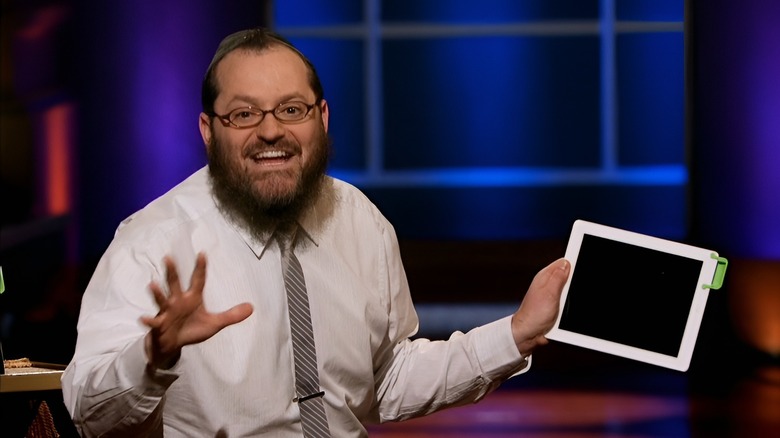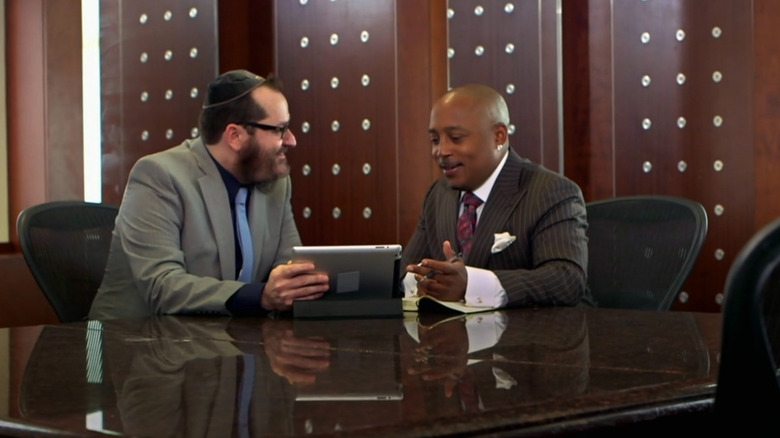What Happened To SoundBender From Shark Tank Season 4?
We may receive a commission on purchases made from links.
While many "Shark Tank" tech contestants show promise, there's almost always a blatant weakness to their pitch, from the logistical issues of Season 7's Clean Cube to the unsatisfactory responses from the founder of Season 15's Da Vinci Eye. But every now and then, an entrepreneur will take the stage who checks off all the boxes. Among them was Rabbi Moshe Weiss, who appeared on the show's fourth season to pitch his product, SoundBender. The powerless magnetic sound amplifier is designed to cup around an iPad's speaker to better enhance any sound and direct it towards the listener.
Prior to the creation of SoundBender, the Minnesota native founded the Yeshiva High School of the Twin Cities. Following the school's closing during the recession, Weiss was gifted an iPad to cheer him up. He fell in love with the tablet, but found it difficult to hear while activity was going on at home, often resorting to cupping his hands around the speaker to pick up sound. This gave him the idea for what would become SoundBender and after developing a makeshift prototype, Weiss made it his mission to make the product a reality. Throughout 2012, he launched two successful Kickstarter campaigns that raised a combined total of over $18,000.
Weiss eventually appeared on "Shark Tank" Season 4, Episode 14. His infectious enthusiasm, effective product, and knowledgeable approach were enough to gain the interest of Daymond John and the two struck a deal. Much success followed before an unexpected tragedy cut the company's life short. Keep on reading to learn more about SoundBender's time during and after "Shark Tank."
What happened to SoundBender on Shark Tank?
Rabbi Moshe Weiss entered the tank only hoping to receive $54,000 for 26% of SoundBender. He demonstrated the capabilities of his handy tool, showing how easy it was to attach the magnetic accessory to his iPad and its effectiveness in amplifying the Klezmer music coming from the device. Weiss' presentation, anchored by his fun-loving personality, was well-received by the Sharks, who immediately connected with the product's appeal.
The former educator was producing each unit for $1 and selling them for $12.99. At this point, 7,000 units had been sold over the course of six months, most of which were coming from online sales. His intent with the $54,000 was to make mild adjustments to the design and make new molds from that. Weiss also had an inquiry from Walgreens, opening a whole new retail avenue for the company.
Kevin O'Leary asked if Weiss would be open to licensing out the technology and getting royalties, to which the entrepreneur refused. O'Leary dropped out, followed by Mark Cuban, who failed to see the scalability of the business. Barbara Corcoran also proposed a potential royalty setup to ensure she'd get her money back, but was once again turned down by Weiss as he deemed it counterproductive to the company's growth. At the end, Daymond John and Mark Herjavec made the same offer of $54,000 for 40%, with John's deal being contingent that the Walgreens deal would close. Weiss ultimately went with John, feeling that his marketing expertise would elevate the product.
SoundBender after Shark Tank
Some may have found it odd that SoundBender founder Rabbi Moshe Weiss chose to go with Daymond John as his "Shark Tank" investor when Robert Herjavec made the same deal without the stricter stipulations. However, Weiss favored John's offer for this exact reason. "I'm glad to be working with Daymond, he's so inspirational," he shared in a 2013 interview with Shark Tank Blog. "Robert's offer was generous, too – but I wanted to take the hard road. If you want to be an entrepreneur, you take the hard road [...] Daymond is the branding King, and he has a great hug!"
Thankfully, John was able to offer Weiss more than some good hugs. The SoundBender's first "Shark Tank" segment would air on February 1, 2013. On top of sales spiking online following the broadcast, the deal with Walgreens went through, and the product appeared in roughly 350 US locations. Weiss would appear once again on "Shark Tank" Season 5, Episode 8 for an update segment.
By the time the piece aired on November 8, 2013 (a little over nine months after Weiss' initial appearance), SoundBender had gone from making $7,000 to nearing $250,000 in sales. Weiss also became more open to the idea of licensing. He and John met with the team from Wish Factory, who proposed using Marvel's Avengers imagery on SoundBender, with a guaranteed minimum of $2 million in sales.
An unexpected loss kept SoundBender from going on
Rabbi Moshe Weiss was riding high after SoundBender's "Shark Tank" appearance. In the wake of new licensing and retail deals, he and investor Daymond John made plans to use their newfound resources to expand upon the initial product. They envisioned developing SoundBenders that were compatible with iPhones, Galaxy devices, and even large screen TVs, as well as getting it seen on major shopping networks. The reason for these ambitions never coming to reality was due to an untimely loss.
On August 28, 2016, Moshe Weiss died at the age of 41 from heart complications. Daymond John commented on the loss in a Facebook post reading, "Such heartbreaking news. He was a man that would bring energy and joy to any room he entered. He would make you smile no matter what was going on in your life. Rabbi Moshe will truly be missed. R.I.P. my friend." With his death, SoundBender itself ceased operations. Today, while the SoundBender website is still up, it's very clearly outdated. Likewise, the Amazon listing for the product labels it as being "Currently Unavailable."
It's truly heartbreaking that SoundBender couldn't go on. Not only was the company on the road to improving its technology and potentially developing one of the best non-Apple iPad accessories out there, but its high-spirited founder could have been a great influence on future entrepreneurs. Perhaps the best lesson to take away from Weiss's journey was said in his interview with Shark Tank Blog, where he stated, "You could have the best idea in the world, but if you don't work at it, you'll never succeed."



